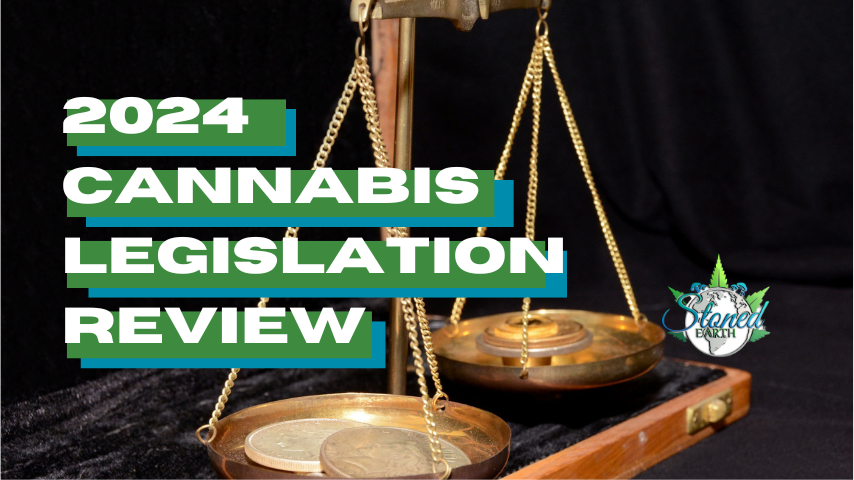
2024: Becoming a Stoned Earth - A Roundup of Cannabis Legislation for 2024
2024 continued to be a pivotal year for cannabis and marijuana legalization in the United States. Building on the momentum of previous years, significant strides were made in state and federal policy, bringing us closer to comprehensive reform. However, not every bill passed and there’s still a lot of work to do. Here’s an overview of the latest developments:
State-Level Legalization:
Ohio:
-
Ohio became the 24th state to legalize adult-use cannabis following a successful ballot initiative in November 2023. Legal recreational marijuana sales in Ohio began on August 6, 2024. In the first five days, sales exceeded $11 million, indicating strong consumer demand, making Ohio a key player in the Midwest cannabis market.
Florida and Hawaii:
-
Although a majority of Floridian voters voted to legalize adult-use cannabis, the constitutional amendment failed to attain the supermajority (60%) required to pass. This is often attributed to the grassroots efforts of cannabis enthusiasts to sink the legislation due to its great imbalance in favor of industrial growers and prohibition on home-grow.
-
The Hawaii senate passed a bill to legalize adult-use cannabis; however, the measure failed to become law. Medical marijuana continues to be legal in Hawaii, as it has been for the last 24 years.
Medical Cannabis Expansion:
-
Nebraska became the 39th state to legalize medical marijuana, offering new hope to patients with qualifying medical conditions.
Beyond Legalization:
Federal Scheduling Review:
-
The Biden administration’s review of cannabis’ classification under the Controlled Substances Act reached a milestone in late 2023. The Department of Health and Human Services recommended reclassifying cannabis from Schedule I to Schedule III. If implemented, this change would significantly ease federal restrictions and improve research and business opportunities.
Cannabis Banking Reform:
-
The Secure and Fair Enforcement (SAFE) Banking Act was finally passed by Congress in early 2024, allowing cannabis businesses access to banking services. This long-awaited reform marks a turning point for the industry, enabling safer transactions and improved financial stability.
Tax Relief for Cannabis Businesses:
-
More states, including California and Michigan, enacted tax relief measures for cannabis businesses, aligning state tax policies with the federal push for reclassification. These measures aim to support small businesses and promote market growth.
Workplace Protections:
-
Colorado expanded its workplace protections for cannabis users in 2024, joining states like Washington in ensuring that off-duty cannabis use does not lead to employment discrimination. These policies prioritize privacy and fairness for workers.
Expungement Initiatives:
-
New York and Illinois ramped up expungement efforts, clearing thousands of past cannabis convictions. These initiatives represent critical steps in addressing the social justice aspects of cannabis reform.
Challenges and Opportunities:
Despite this progress, challenges persist. Federal prohibition continues to hinder interstate commerce and comprehensive research. Additionally, ensuring equity in the burgeoning legal market remains a key issue. Programs to support minority and economically disadvantaged entrepreneurs are essential for creating a fair industry.
Looking Ahead:
2025 is shaping up to be another landmark year for cannabis policy. With increasing public support and bipartisan legislative momentum, the path toward full federal legalization and robust regulatory frameworks seems more achievable than ever.
Stay Informed:
To stay updated on the latest developments in cannabis and marijuana law, here are some helpful resources:
By staying informed and engaged, we can all contribute to shaping a future where cannabis policy is rooted in science, fairness, and individual liberty.
Help us destigmatize and Legalize Nature. Our vision is... a Stoned Earth.

